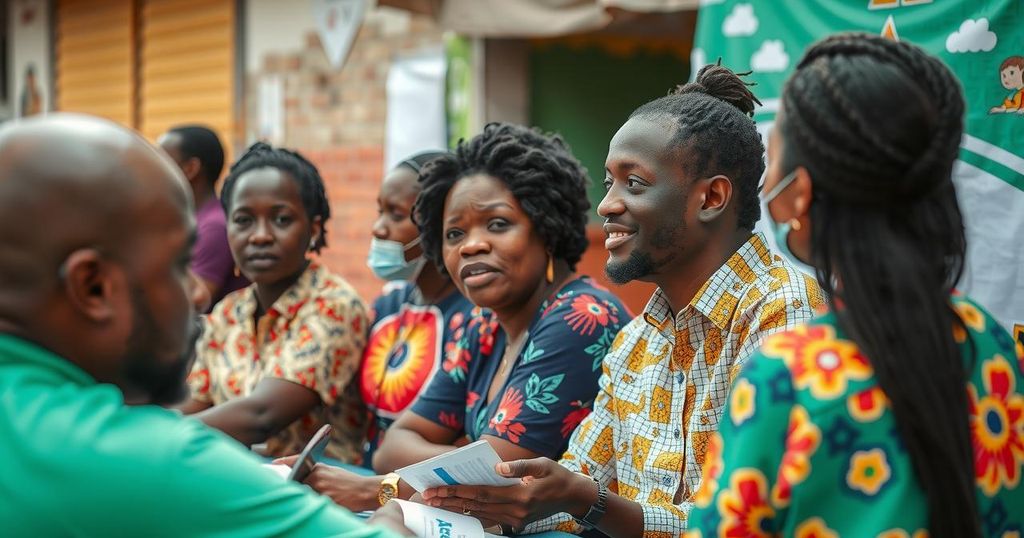Accra’s Odododiodio district is intensely focused on the upcoming presidential election, primarily split between ruling party candidate Mahamudu Bawumia and opposition leader John Mahama. Economic challenges, including high inflation and unemployment, weigh heavily on voter decision-making. Historical party support and family traditions also drive voters’ choices, making this election a closely contested event in a critical region.
As Ghanaians prepare for the upcoming presidential election on December 7, 2024, the atmosphere in Accra’s Odododiodio district is charged with anticipation. Residents are predominantly considering two candidates: Mahamudu Bawumia from the ruling New Patriotic Party (NPP) and the opposition’s John Mahama of the National Democratic Congress (NDC). Previous elections have shown this area as a competitive battleground, with the NDC winning a narrow victory in parliamentary votes yet the NPP securing the presidency in 2020. Now, as economic issues loom large over the electorate, Odododiodio’s voters remain divided in their preferences.
Economic conditions have been a primary concern, reflecting high inflation rates of 23 percent and significant unemployment. Local residents are discussing the candidates’ potential for improving Ghana’s economy following a debt default. Emmalyn Asiamah, a first-time voter, expressed allegiance to the NDC, citing a desire for change, while Samuel Laryea, who leans towards the NPP, defended the ruling party’s candidate’s economic credentials. Voters highlight stark opinions on blame for the economic crisis, which activists trace back to global factors like the pandemic and the Ukrainian conflict.
Both candidates come from northern Ghana, an area that has historically supported the NDC; however, voter sentiment appears split this election cycle. Bawumia, a UK-educated economist, attempts to revitalize faith in the NPP’s management of the economy, promising continued support for free education and healthcare. In contrast, Mahama’s platform includes creating a “24-hour economy” aimed at boosting job opportunities through expanded industrial hours. Political analysts have noted the tightening race, observing increased campaigning efforts from both sides.
Within the community, internal family affiliations significantly influence voting behaviors, aligning closely with traditional party support. As neighbours gather to discuss the electoral climate, it becomes evident that the resolution of economic challenges will play a vital role in determining the election outcome in such a closely contested political landscape.
Ghana’s political landscape has historically been dominated by two major parties, the National Democratic Congress (NDC) and the New Patriotic Party (NPP), which have alternated power since 1992. The economic environment in Ghana has recently drawn attention due to high inflation and job scarcity, particularly following the nation’s debt default in 2022 and a subsequent International Monetary Fund bailout. Voters are fiercely debating the effectiveness and future capabilities of both candidates amidst these pressing economic issues, revealing the importance of the Greater Accra region in shaping electoral results. With Accra being the most populous region, it serves as a strategic battleground that could swing the election in favor of one candidate or the other. The dynamics of generational loyalty further complicate the voting decisions, as family traditions and historical party allegiance significantly influence individual choices.
In conclusion, the upcoming presidential election in Ghana stands to be a decisive contest primarily between Mahamudu Bawumia and John Mahama, with the Greater Accra region, notably Odododiodio, poised to play a critical role. Economic concerns predominate in voter decision-making, as residents grapple with high inflation and rising living costs while remaining influenced by familial voting patterns. As the elections draw near, the populace’s divisions may lead to a closely fought race, the outcome of which will ultimately depend on how effectively candidates can resonate with voters’ economic aspirations and traditional loyalties.
Original Source: www.seychellesnewsagency.com






